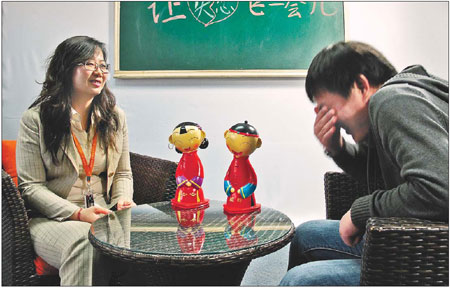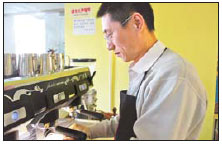Society
Old goals, new paths
Updated: 2011-01-27 07:11
By Lin Qi (China Daily)
|
Dating counselor Zhang Chunmei talks with one of her clients at her Beijing office. Jiang Dong / China Daily |
Changing lifestyles are creating unconventional career choices, Lin Qi finds.
The nation's opening-up and rapid urbanization have not just enriched people's lives but also created many new professional paths. Some of these jobs reflect the growing influence of foreign cultures and lifestyles, while others have emerged in response to better living and working conditions. Since 2004, the Ministry of Human Resources and Social Security has identified more than 100 new professions, which are nationally recognized and require certification. The spectrum of career choices has expanded and now includes jobs such as sports agent, exhibition planner, animator and color adviser, among others. Meanwhile, many new ones, even though not yet officially recognized, are set to become an integral part of the job scene. An old saying goes that every trade produces its own masters. A show dog handler, a dating counselor and a barista tell why they find their jobs fascinating.
Playing 'agony aunt'
Zhang Chunmei believes easing someone's loneliness is more important than ridding them of a disease.
That's why this internal medicine doctor of eight years quit her job four years ago to become a dating counselor at Baihe.com, a major matchmaking service provider.
"There are only a few diseases that a doctor can diagnose and treat, but healing someone's mind and soul knows no limits," Zhang says.
For many years, people used to turn to a warm-hearted "aunt" at the neighborhood committee for free marriage counseling and matchmaking. It is no longer an option for urban singles, who seek out dating counselors with a professional background in psychology.
Zhang begins her counseling with thorough communication with the client about their growing experiences, family backgrounds and relationship history.
"Many people don't know what they want from a relationship or what kind of a life partner they wish for. My first job is to help people find the answers to these questions, and analyze why they are still single," Zhang says. "I then set up dates for the client with our other registered members."
An integral part of the whole process is her recommendation. "It has to read like an essay highlighting the 'sparkle' of the person's character," she says. "One of my clients is an accomplished career woman. But instead of stressing her doctorate and good looks, I describe her caring nature and her love of plants."
A complete counseling service lasts a whole year. Zhang says every one or two months she holds a review with her client to see if they need a new date, or to take the relationship to the next level.
"Most people know little of how to maintain a relationship. There are many reasons, for instance, strict and conservative parents who disapprove of their children dating, an educational tradition that glosses over gender differences, and tight work schedules," she says.
Some people, Zhang says, influenced by overly sensational TV dramas or romance novels, equate marriage with romance and set up unrealistic expectations of marriage. Some others, particularly men, stay single because of their fear of family responsibilities.
A client once told Zhang she wanted a well-paid husband. But later she found that the woman was repelled by marriage and family life. "When she was a child, her parents quarreled a lot. She was raised by her grandmother, who preferred boys to girls. She felt insecure about marriage and her insistence on a wealthy husband was really an obstacle she was creating to reject marriage.
"I suggested she receive psychotherapy first," Zhang says. "I told her I would be there for her until she recovered from her childhood trauma."
She says a good advisor should be a trustworthy listener and a keen and objective observer. "A soon as someone enters the counseling room, I make a note of the facial expressions, style of dressing, how rapidly they talk and even the way they hold a cup, as they all point to one's personality. All of this is of great help especially when the client doesn't talk much."
Sometimes Zhang needs to do some homework to better understand the way people think. Once, a client said he liked Meditations (a series of philosophic writings by Roman emperor Marcus Aurelius). So for days she went online to read some chapters. Another client is a Christian, so Zhang got herself a Bible.
A senior counselor, Zhang charges 500 yuan ($76) per hour for her service, and earns about 7,000 yuan a month.
A 38-year-old single woman herself, Zhang says she empathizes with people coming for advice.
"It is okay if my client decides to stay single when the counseling ends, as long as they truly understand the meaning of marriage and love," she says.
Coffee only as good as barista
|
Barista and trainer Li Furong prepares a cup of coffee. Provided to China Daily |
Li Furong worked as a bartender at a Beijing hotel for nearly two decades. He not only mixed alcoholic drinks but also made coffee, learning about the different types of coffee only through the instructions on the coffee machines.
Now a State-certificated barista and trainer, Li coaches students at the China Barista Coffee School.
"We now have textbooks, and even bring in veteran baristas from home and abroad to be guest teachers," Li says.
"Not only do students learn how to make a cup of coffee, they also get to know how a coffee bean is cultivated and roasted, the ideal holding temperature of coffee and the serving etiquette; everything that goes into the making of a perfect cup of coffee."
With the expansion of big coffee chains in China, coffee drinking has become a sub-culture of urban life, spearheaded by office workers and college students. While it is a long-standing tradition for Chinese to do business over dinner, now more people are holding their discussions over coffee.
"The country's coffee demand is growing, making barista a first-choice job for young people entering the coffee industry," Li says.
A barista is the soul of a coffee house, he says.
"A good barista will talk with his guests. He will try to influence people's coffee drinking habits and make them addicted to his coffee-making skills," he says. "For instance, I have a regular guest who always orders cappuccino. When he visits the next time, I will attempt to make him try the newly bought coffee beans or other types of coffee."
It's also vital for a barista to be knowledgeable about different coffee beans, Li says. Many coffee house owners know little about coffee and entrust the barista with the purchase and appraisal of beans. A well-trained barista is obligated to reject beans that may be cheaper but do not make the cut.
Sometimes a barista roasts the beans himself to understand the coffee flavors better. And an excellent barista is one who is never content with preparing coffee as per the book but will try to come up with his own unique creations, Li says.
"A top-of-the-range barista has a discerning tongue. He enjoys testing the slightest change in smell and mouthfeel when he drinks coffee. It is like wine tasting," Li says.
His students not only find jobs easily but some have also won awards at the annual China Barista Championships, first held in 1992, and the China World Barista Championships.
"There are no more than 1,000 baristas in Beijing and their average pay is relatively low, between 1,800 ($273) and 2,000 yuan, while a coffee house manager makes at least 4,000 yuan per month. But the best baristas are in great demand in fancy restaurants, bars and clubs.
"An average Chinese drinks three cups of coffee per year, while the world average per capita consumption is 130 cups. The market has great potential," Li says.
Specials

President Hu visits the US
President Hu Jintao is on a state visit to the US from Jan 18 to 21.

Ancient life
The discovery of the fossile of a female pterosaur nicknamed as Mrs T and her un-laid egg are shedding new light on ancient mysteries.

Economic Figures
China's GDP growth jumped 10.3 percent year-on-year in 2010, boosted by a faster-than-expected 9.8 percent expansion in the fourth quarter.

